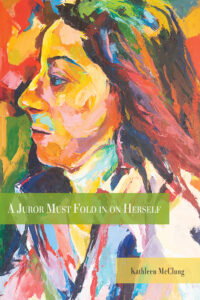“This book is a celebration of form: villanelle, ghazal, rondeau, pantoum, cento, sonnet, and two impressive linked series (“Summons” and “The Juror’s Lament”). The forms are masterfully executed, but I really must bow before McClung’s mastery of the sestina, difficult to pull off anytime, much less with the grace managed in poems like “The Sequestered Juror Writes a Sestina.” In every case, form works with rather than against expression of a vital, moving, and essential humanity. The book marshals humor and suspense to forge a compelling narrative that builds up to and back down from a big reveal in “The Forewoman Speaks,” the sequencing so well done that at times I felt as if I were reading a short story or novella. All along the way, I found myself marking memorable lines, images, and diction. A great read!”
Rebecca Foust, author of Paradise Drive and ONLY, forthcoming from Four Way Books
“Prepare to be dazzled by Kathleen McClung’s bravura performance in A Juror Must Fold in on Herself. In this thoughtful, elegant, wry examination of our courts, McClung deploys a menagerie of forms: the villanelle, the pantoum, the rondeau, the cento, and the ghazal. This combination of restraints eerily captures the ruminations of a juror trapped in her thoughts and constrained by the structure of the criminal justice system. Later, in a crown of sonnets, she addresses a grandmother and considers this relative’s role at her job and in society at large. McClung, a master of formal verse, burrows into language and experience. From each new perspective, she walks us into the back halls of our jury system. Join her.”
George Higgins, author of There, There
“What I love most about Kathleen McClung’s poetry is how it reveres daily life. By applying her deft hand with form to the everyday, she makes us all sonnet-worthy; our routine lives deserving of a villanelle’s refrain, a sestina’s complexity. In A Juror Must Fold in on Herself, she once again makes us pause where we might otherwise just glance, and see something worthy and profound —here the civic chore of jury duty. Each poem builds on the last, creating a collection at once deeply personal and resonant. The poems progress from the juror’s isolation (literal and emotional) while sequestered, to the introspection that comes with deliberation; to the terrible weight of judgment—and its impact on the one who judges as well as the judged. In her gorgeous crown, “Summons,” McClung’s juror contemplates the guilty verdict they have handed down and wonders, “Yes, confess: I’m flattered lawyers chose/this thinker striving (mostly) to be fair./ And yet my heart, my heart. Beyond repair?” The collection, and this final question, remind us that to be wise in judging others (as this juror promises to be) we must inevitably turn inward, and do not–perhaps should not–come away unscathed.”
Laura Schulkind, attorney by day, author of Lost in Tall Grass and The Long Arc of Grief
“Anyone who’s ever served on a jury will recognize the experience deftly depicted in A Juror Must Fold in on Herself. Those who haven’t served will be intrigued by the ritual of the service as wisely woven into these poems by McClung’s use of repetitive forms: villanelles, ghazals, and pantoums, among others. There is wisdom and pathos here; solemnity and humor. I plan to make a gift of this fine collection to more than a few legal professionals.”
Lynne Thompson, author of Fretwork
“In Kathleen McClung’s new prize-winning chapbook, all the elements of form and function, freedom and sentences come together in a distillation of the poetic elements—a bliss of plainspeak that listens and sees. And there’s humor, the banality of common ironies and evils too small to fail us, or inspire us to move forward.”
John Hawkins, in OpEdNews
Order online: https://www.rattle.com/chapbooks/a-juror-must-fold-in-on-herself/
